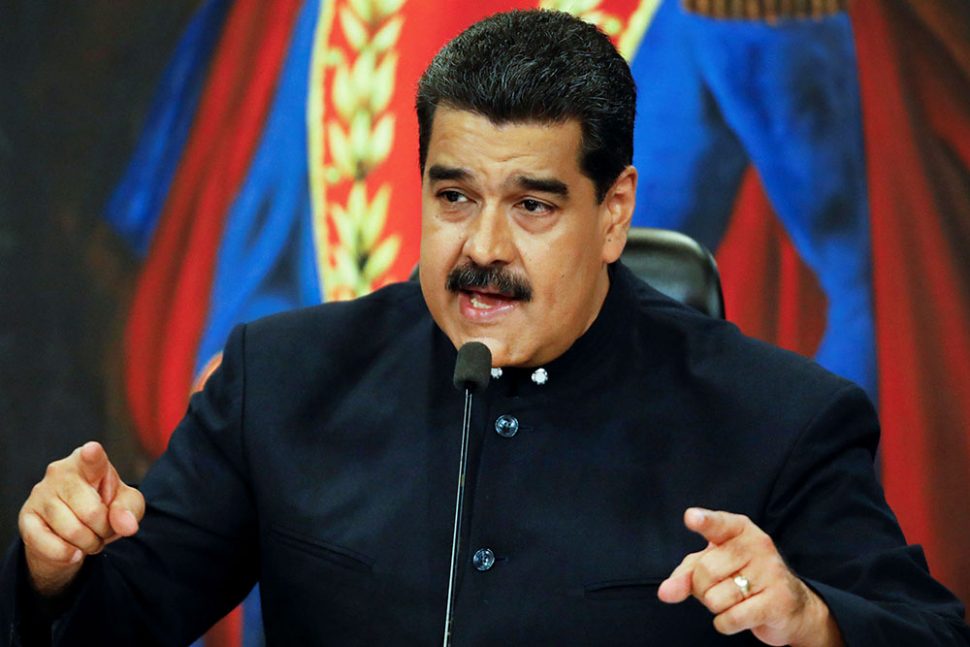There appears to be no short-term end in sight to either the political crisis facing the administration of Vene-zuela’s President Nicholas Maduro or his country’s beleaguered economy as Washington earlier this week announced yet another round of punishing sanctions against the country believed to possess the world’s largest oil reserves.
What now bears the resemblance of a trek to an inevitable meltdown in the Venezuelan economy and the concomitant worsening of the country’s attendant humanitarian crisis threatens to assume even more dire proportions in the wake of the disclosure of the most recent round of economic sanctions against the government in Caracas.
What the Maduro administration is describing as “arbitrary economic terrorism against the Venezuelan people” has manifested itself in Washington’s presidential executive order promulgated on Monday, forbidding American companies from doing business with the political administration in Caracas.
This most recent salvo of sanctions comes perilously close to a complete shutdown of the country’s oil sector which provides more than 90% of the country’s earnings. Additionally, it not only freezes the US-based assets of members of the Venezuelan government, but anyone who defies the latest sanctions by continuing to do business with Maduro’s administration.
By specifically forbidding transactions involving the Venezuelan state-run oil companies Petróleos de Venezuela, S.A. (PdVSA) and US oil companies, the Trump administration is taking unerring aim at bringing the country’s oil sector to a halt as a means of forcing Maduro from office.
This week’s presidential order from Washington has seemingly left open a door that allows for humanitarian aid to the country as well as – at least for the time being – exemptions from the barrier to doing business with Caracas, the notable one being the US oil company Chevron and its various contractors which was granted in July and is due to expire in October.
What this development means for Guyana’s South American neighbour already neck deep in political crisis, domestic instability and a seeming unending involuntary migration to neighbouring countries is unclear. While Washington has said repeatedly that its incremental economic pressure is intended to force the removal of the Maduro administration from office, other shades of international opinion hold that the increased US economic pressure could have the effect of stiffening the resolve of the incumbent administration to remain in office, further deepening the humanitarian crisis and leaving Venezuela in a protracted condition of economic uncertainty.
Indeed, just such a view was expressed by the United Nations earlier this week when it stated that last Monday’s announcement by Washington could worsen even further the country’s on-going humanitarian crisis.
As has been the case following the earlier rounds of US sanctions, the Maduro administration has again fired back a message of intransigence, describing the further tightening of US economic sanctions as “the most grotesque and shameless sacking in international relations’ modern history.”
The latest US sanctions have triggered what has been described as a ratification of President Maduro’s earlier call “for all Venezuelans to confront the economic and political terrorism in this new phase.” Indications of his administration’s deepening concern in the wake of this week’s action by the US were, however, manifested in the démarche by the country’s ambassador to the UN, Ambassador Samuel Mancada, to the world body seeking its intervention.
Washington’s increasing targeting of Venezuela’s critical economic asset, its oil sector, and its declared intention to ‘punish’ countries seeking to undermine the effects of its sanctions against the administration in Caracas signals its growing determination to bring about regime change to replace what it sees as an ideologically inappropriate regime in a hemisphere teeming with pro-United States governments. The Maduro administration is now in the grip of what is seen as the most severe economic sanctions ever issued by Washington and the likes of which have not been imposed in the Western hemisphere in more than three decades.
Reports of increasing doom and gloom in the performance of Venezuela’s oil sector, have worsened steadily over the past three years with production declines further accelerating in 2018, increasing to an annual average of 135,000 barrels per day during the first quarter of this year. Oil intelligence reports also point to a decrease in the number of active oil rigs in the country from nearly 70 rigs three years ago to 24 rigs in the first quarter of this year. The expectations are that this week’s tightening of US sanctions will result in a further significant decrease in Venezuela’s crude oil production over the remainder of 2019.



